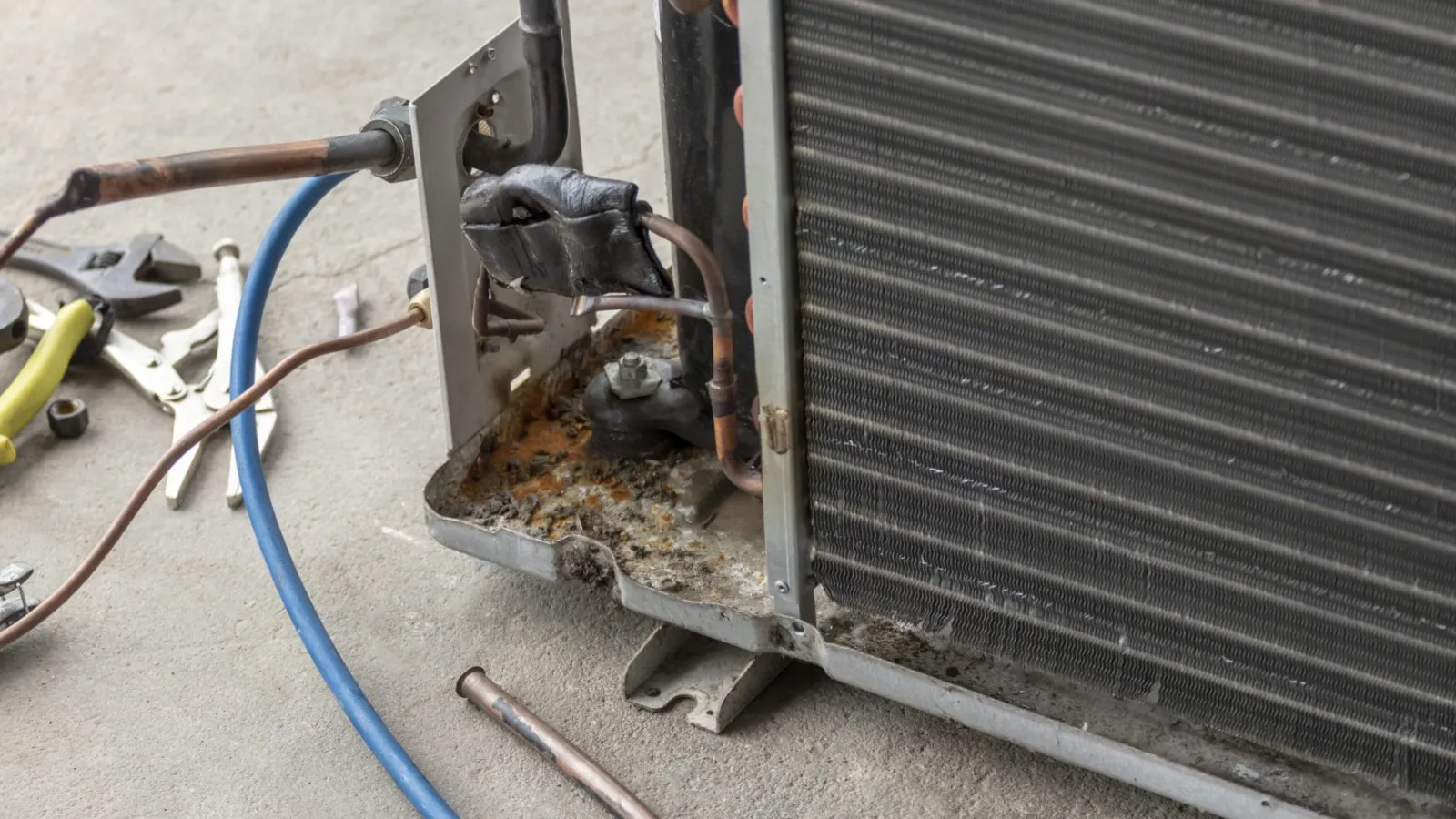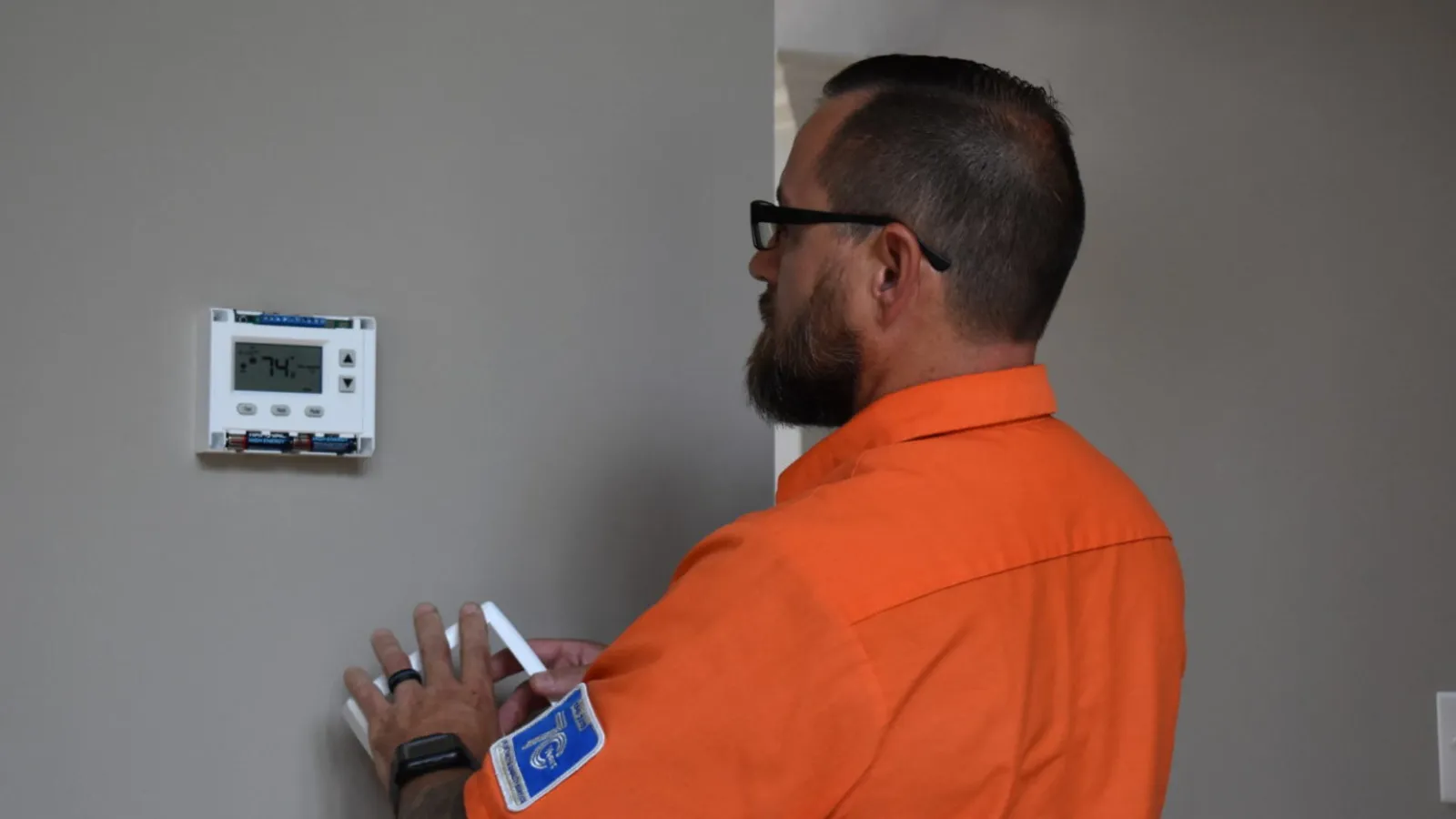H1: Common Air Conditioning Noises and What They Mean
Strange air conditioning noises can turn your peaceful home into a stressful one. More importantly, they often mean your AC unit or HVAC system needs attention. Ignoring them can lead to costly breakdowns or poor efficiency.
At Estes Services, our certified HVAC technicians help homeowners across Metro Atlanta stay cool and comfortable all year long. Below, we explain what each noise means and when to call for air conditioner repair.
H2: 1. Whistling
A whistling sound usually points to air leaks in your ductwork. When cool air escapes through small openings, it creates that high-pitched whistle — and makes your system work harder to cool your home.
Inspect visible ducts for loose connections or cracks. Small leaks can be sealed with mastic, but if the sound continues, schedule a professional duct sealing service. Proper sealing improves indoor air quality and keeps your HVAC system energy efficient.
H2: 2. Buzzing
If you hear a buzzing sound from your outside air conditioning unit, it could mean debris in the condenser, loose parts, or electrical problems. Sometimes, it's a dirty air filter or a malfunctioning control panel.
Because buzzing may involve wiring or voltage issues, turn off the power and contact a trusted HVAC contractor. Estes Services provides safe, long-term, and cost-effective AC repair to keep your heating and cooling systems running efficiently.
H2: 3. Clicking
Hearing a single click when your system starts or stops is normal. But repeated clicking could signal a failing thermostat, loose electrical connection, or a problem with the control panel.
Keep your system in top shape with regular HVAC maintenance and tune-ups. Annual service helps prevent electrical issues and ensures reliable, cost-effective operation in the long term.
H2: 4. Clanking
Clanking noises mean something inside your AC system is loose or out of balance. It might be a broken fan blade, an unbalanced compressor, or internal parts hitting each other.
Turn off your unit immediately and call Estes Services for professional air conditioning repair. Quick action can prevent more serious mechanical damage.
H2: 5. Chirping
Chirping noises are often harmless. They can occur when parts inside the blower fan or motor need lubrication. Common causes include:
Dry blower motor bearings
A worn or loose fan belt
The blower fan rubbing against other components
If the noise fades after a few minutes, mention it at your next maintenance appointment. If it turns into a squeal, it may signal a blower motor malfunction that requires immediate attention.
H2: 6. Gurgling
A gurgling or bubbling sound typically points to air trapped in the refrigerant line — a clear sign of refrigerant leaks. Since refrigerant requires a certified professional to handle safely, avoid DIY repairs.
Schedule air conditioning repair with our licensed HVAC technicians. Repairing refrigerant leaks quickly keeps your system energy efficient and prevents frozen coils or poor cooling performance.
H2: 7. Banging
Banging sounds usually mean something is broken or loose inside your compressor. Common culprits include a piston pin, crankshaft, or a loose connecting rod.
Our professional HVAC services include full inspections to diagnose and fix the problem before it leads to costly replacement.
H2: 8. Squealing
A squealing noise can come from either the indoor or outdoor components of your AC unit.
Outdoor Unit
Bad fan motor bearings
A failing compressor
Indoor Unit
Misaligned or damaged blower belt
Worn blower motor bearings
Blower motor malfunction
Minor issues can often be fixed with lubrication or belt replacement. However, if the noise persists, call for expert air conditioning repair. Upgrading to a variable speed motor can reduce noise, improve airflow, and help you stay cool more efficiently.
H2: 9. Screaming
If your AC begins screaming or shrieking, turn it off immediately. This sound can indicate dangerously high compressor pressure or a refrigerant leak — both of which are safety hazards.
Call Estes Services right away for emergency air conditioner repair. Our technicians will restore safe operation and protect your system from further damage.
H2: Is It Time to Replace Your Air Conditioner?
If your air conditioner is old, noisy, or inefficient, it may be time for an upgrade. New, variable speed systems are quieter, more energy efficient, and better for your indoor air quality. They're also a cost-effective, long-term investment in comfort.
Our team can help you find the perfect energy-efficient air conditioner for your home and budget. We install advanced heating and cooling systems designed to keep your home comfortable year-round.
H2: End the Noise with Estes Services
Don't let air conditioning noises disturb your comfort. Whether you need a simple tune-up or a complete repair, Estes Services has the experience to get your HVAC systems running smoothly again.
📞 Call (404) 362-6960 or visit estesair.com to schedule your air conditioning repair in Metro Atlanta today.
It's That Easy; It's Estes.
FAQs About Air Conditioning Noises
1. Why is my outside AC unit buzzing?
Buzzing may mean debris, loose parts, or electrical problems. Turn off the system and schedule HVAC repair before further damage occurs.
2. Can I keep running my AC if it's making noise?
If it's a new or loud noise — like banging or screaming — turn it off immediately and contact a professional HVAC contractor. Running it may worsen the problem.
3. How can I prevent my AC from making noise?
Routine HVAC maintenance prevents wear on blower motor bearings, belts, and electrical parts, keeping your systems running quietly and efficiently.
4. How long do air conditioners last in Atlanta?
Most AC systems last 10-15 years. Replace air filters regularly and schedule annual tune-ups to maximize performance and airflow.
5. When should I replace a noisy AC system?
If repairs cost more than half the price of a new unit or your system is over 12 years old, consider upgrading to a variable speed model. Schedule a free AC installation estimate with Estes Services today.


